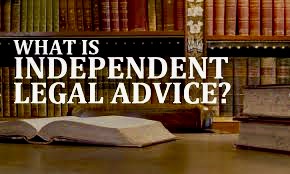Many transactions are set aside in British Columbia by the courts on the basis that true independent legal advice was not obtained by the person making a radically changed will or transferring an asset for little or no consideration.
A lawyer’s duty in such situations is to be the vanguard of providing true Independent legal advice (ILA) so as to protect a victim of undue influence or lack of mental capacity being taken advantage of by an unsavory character.
Thus it is critically important for the lawyer to ensure that he or she is in a position to provide truly independent legal advice to the client.
At any given time I have a case where that has not been the case.
For example a lawyer takes instructions form a daughter of the deceased that her mother wishes to transfer her property into joint tenancy with the daughter.
The lawyer meets with them both at the same time, confirms the instructions with the mother in the presence of the daughter, and transfers the property into joint tenancy for m$1 consideration, and renders the account to the daughter.
The client in that case is the daughter, not the mother. The mother has in effect given away all of her assets to the daughter without the benefit of any legal advice, let alone independent legal advice.
The mother in that scenario might well have balked at doing such had she received true independent legal advice. The lawyer acting for both the daughter and the mother is in a conflict of interest.
7 Reasons a Lawyer Cannot Provide Independent Legal Advice
Accordingly, a lawyer is not in a apposition to provide true independent legal advice if any one of the following is present (not an exhaustive list):
- The legal fees are being paid by the person taking advantage under the relationship rather than the person causing the transfer or changing will to be made;
- The lawyer does not have a full understanding of the clients total assets, income and expenses and is unable to assess a discuss with the client the extent to which it may leave them vulnerable or impoverished.Detailed notes of the financial situation of the possible victim should be entered contemporaneously.;
- The lawyer has a prior professional relationship with the person taking advantage;
- Some or all of the instructions have come from the party taking advantage;
- The lawyer has a past relationship such as personal, friendship, or the like with the party taking advantage;
- The lawyer is acting in a purported joint retainer with the person taking advantage;
- The party taking advantage is present at the time the advice or instructions are given or when the documents are signed
If any of the after said situations are present, then it is incumbent on the lawyer to refer the client out to another lawyer for true independent legal advice without any involvement of the party taking advantage.
There is a failure on the part of the lawyer to ask probing questions as to the reason for the will change or transfer of property for no consideration and to ensure that the client attains a true and complete understanding of all its implications.
In my experience as a BC Lawyer, after a full and complete understanding is brought to bear, clients will often balk at entering into the change of will or property transaction. It is common that elderly persons are often pushed into a transaction based on poor explanation or untruths about other interested parties.

